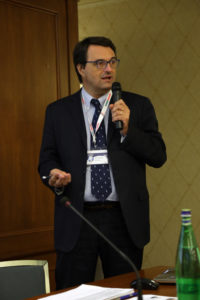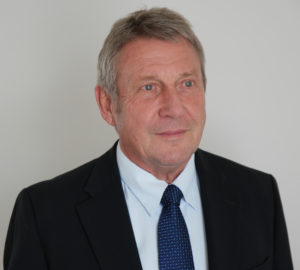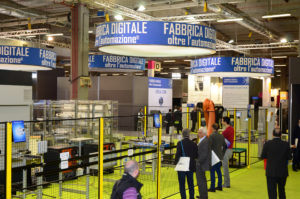Both the Italian and the International mould-makers’ association spoke their minds out about the COVID 19 related challenges that the industry is facing, whereas UCISAP president, Alessandro Scalici, wrote an open letter that brings these criticalities to the attention of the Italian government.

On April 14th, the president of the Italian mould-makers’ association (UCISAP) Alessandro Scalici addressed national institutions with an open letter that described the very difficult situation with which, due to the COVID-19 pandemic, the industry had to deal
On April 14th, the president of the Italian mould-makers’ association (UCISAP) Alessandro Scalici addressed national institutions with an open letter that described the very difficult situation with which, due to the COVID-19 pandemic, the industry had to deal. Scalici recalled that the category traditionally plays a leading role on the European manufacturing scenario, together with German colleagues, thanks to its competitive quality standards. As a part of the metalworking sector, mould makers are key «in the production process of plastic materials, metal die casting and sheet metal forming». Their activity holds therefore a highly strategic value «for domestic economy» as well as in terms of export (55% of their overall output); and is «intrinsically tied to the essential production chains». Most of them are small and medium companies (15-20 employees) but nonetheless they are at the very forefront of innovation, given the best of breed technologies and skills they rely on. Pointing out that their safety and biological risk management measures comply with the «the standards required by the March 14th, 2020, protocol», with its open letter Scalici aimed to bring the MPs’ attention on the controversies of ATECO codes, the Italian equivalent of the NACE codes. Mould makers falling under codes 25.73.20 and 33.11.01 (the majority) were forced, by decree, to momentarily stop their activities, whereas those that were filed under the 28.96.00 code were allowed, by the same decree, to continue. UCISAP president noticed that no such ambiguity has so far taken place in any other European country, triggering «an unfair competition scenario» in which German competitors, for instance, could keep collecting and fulfilling orders despite the emergency. «While understanding the emergency», Alessandro Scalici wrote, «we therefore ask you to consider this and therefore to evaluate the reopening to the ATECO codes 25.62.00, 25.73.20 and 33.11.01». At the moment, the Association is still waiting for Prime Minister Giuseppe Conte’s reply. At the same time, UCISAP executive director Giovanni Corti and ISTMA World’s president Robert Williamson offered us an overview of the challenges that mould makers are struggling with, and of the opportunities that they might eventually benefit from once the COVID-19 pandemic is defeated.
«Efficiency and optimization: the vaccines for industry»
Interview with Giovanni Corti, executive director of UCISAP
«There is a feeling of great uncertainty among companies in our sector, also due to the lack of clarity of the measures implemented both locally and by the central government. Just think of the many announcements about the mandatory usage of protective masks. Many companies had already stopped their activities before the most stringent security measures were implemented. At the same time, the widespread desire to get back to work as soon as possible is, however, undeniable».
What are the main problems that mould makers must cope with, today, Mr. Corti?
Italian manufacturers display a significant export rate and the strengthening or re-occurrence of customs controls represents a significant obstacle. Trade flows are slowing down dramatically and even abroad the situation does not look less chaotic. This affects, on the one hand, the availability and accessibility of raw materials; and on the other, the projects that companies were working at. A layoff scheme is sometimes the only resource for companies, in order not to erode their finances.
 Is a significant trend towards reconversion by companies in the sector conceivable?
Is a significant trend towards reconversion by companies in the sector conceivable?
If such a trend exists, I do not think it can currently have a major impact. Even before the health emergency exploded, orders were fairly stable and certainly it is now impossible to predict an improvement. Just think of the automotive industry and its general slowdown, also due to the diesel-gate and the debate about electrification. The Geneva Motor Show has been cancelled for the time being, but a good number of players had already given up on unsuspected times. It is curious to note that projects and research are continuing; and so are the requests for quotes: the impression is that the customers are taking advantage of the crisis to trigger tensions on prices.
Meanwhile, the demand for biomedical products and 3D printing services is increasing…
No doubt that those who were already working for the medical industry have seen an increase in production, especially in the field of moulding. The same can be said, for instance, for ventilation valve manufacturers. As for additive manufacturing, it is a valuable support for the production of small series, not on large volumes. To date, it represents is a valid ally; and not a competitor at all.
How could the global mould and manufacturing industry look like, once the pandemic’s over?
Significant changes are of course to be taken into consideration, but compared to the 2008-2009 recession of the scenario is completely different. Back then, difficulties were mainly financial; today the incognita are even more numerous because some operations were completely blocked, and this is something we never experienced before. The recovery can be even faster, the price war even more cruel. This is why efficiency, lean or 4.0 methodologies and optimization will be essential for the relaunch and, for mould makers, they will be a factor of competitiveness.
What kind of initiatives is UCISAP planning and developing in favour of its associates?
We were reluctantly forced to announce the cancellation of the conference scheduled for September but we are trying to share information and sentiment with our associates as much as possible, to understand what strategies to put in place in the short and medium-long term. The goal is to be ready as soon as possible to offer food for thought, a vision and ideas for the aftermath. For different reasons, however, ranging from the completion of the orders that makers previously obtained, to relations with banks and to the layoffs, everyone is on the spot, motivated, committed.
Could a serious and reliable emergency management give Made in Italy some momentum?
First of all, the strong attention to the ethical aspect of the whole crisis must be underlined, and it is witnessed by the fact that many have previously decided to close their doors before the decrees, to safeguard their employees’ health. It means that the market is ethically healthy. Of course, Italy has proven serious and reliable but today, more than ever, it is mandatory for European countries to undertake a common path and, for this same reason, the EU’s own logics must be redesigned.
«The crisis will boost the robotics and automation market»
Interview with Robert Williamson, president of ISTMA World
What are today Your expectations for the global moulding and manufacturing industries?
To be honest, like everyone, my mind is in the present. But going forward, considering the disruption of value chains, it’s going to be vital in future to focus on how prepared we are for risk. There is going to be a need to do a lot of scenarios planning, supply chains will need to be shortened, whereas the introduction of new technologies must be significantly accelerated.
 Are you receiving feedback from ISTMA World associates? And what are your thoughts and impressions, after reading and/or hearing from these companies?
Are you receiving feedback from ISTMA World associates? And what are your thoughts and impressions, after reading and/or hearing from these companies?
Yes, we are keeping in contact with our friends and colleagues worldwide. At this stage it’s difficult to get past the emotion: we all know we have hard times ahead but right now our thoughts and prayers are with the people who are suffering.
Who, in your opinion, is undergoing the harshest times: the Asian or Western companies? And, among the latter, do you think that those who also run businesses and sister-companies in Asia are likely to suffer more or less from the effects of the pandemic?
I don’t think it’s appropriate to comment on the comparisons of Asian or Western companies in the context of the impact of COVID-19. However, I’ve long held the view that for a manufacturing economy, to succeed and grow, a country or economic grouping must have a strong and vibrant tooling industry. The manufacturing efficiency of all products is directly linked to the selection of the tooling used in the production process A tool or mould is not a commodity but rather a highly subjective item. Asia established a highly successful manufacturing base because it first established a skilled tooling sector. When a country outsources its tooling or moulds, it’s also providing insight into its manufacturing efficiency and an understanding of the intellectual property of the product.
Is ISTMA planning to or already offering its associates forms of support, information, consultancy, in order to help them overcome the present criticalities more easily?
Company level support is via the individual national associations. Nevertheless, ISTMA can play an important role by gathering information regarding the multitude of support mechanisms being developed by governments and organisations throughout the world, and sharing it with its members.
Do you think the Covid-19 will drive or is already driving such markets as robotics and automation, among moulders and among the small & medium businesses too?
The fourth Industrial revolution and its future production technologies are already driving the development of the tooling industry worldwide. The COVID-19 pandemic is undoubtedly going to accentuate its importance, and at the same time to strengthen the focus on manufacturing efficiency.
MECSPE 2020 will take place in October at Fiere di Parma
An essential choice to protect the health of staff, exhibitors and visitors and guarantee the smooth running of the event, with focus on the relaunch of Italy
MECSPE, the major reference trade fair event for 4.0 manufacturing and industry , already rescheduled from March to midJune, announces another change of date due to the ongoing Coronavirus emergency. Senaf, in agreement with the exhibition centre, has decided to postpone the 2020 edition once more,now scheduled to take place at Fiere di Parma, from the 29th to the 31st October.
 This decision has been taken in light of close monitoring of the epidemic as it unfolds at an international level, in order to guarantee the smooth running of the event. An act of responsibility in order to protect the health of everyone involved, includingstaff, over 2,300 exhibitors, delegations of buyers from European countries and beyond, and visitors, which last year totalled 56,000. This decision to reschedule will prove essential in the post-Covid period, forging new contents and opportunities and inspiring all production industries and trade associations to focus on a common objective: the relaunch of Italy. MECSPE has been at the side of manufacturing industry enterprises, supporting their technological excellence, and will continue to work to share experiences and ideas right up to October, aware that talent, commitment and creativity are the cornerstones for relaunching industry in our Country. The programme of special initiatives, exhibition hall layout and organisation will remain unchanged.
This decision has been taken in light of close monitoring of the epidemic as it unfolds at an international level, in order to guarantee the smooth running of the event. An act of responsibility in order to protect the health of everyone involved, includingstaff, over 2,300 exhibitors, delegations of buyers from European countries and beyond, and visitors, which last year totalled 56,000. This decision to reschedule will prove essential in the post-Covid period, forging new contents and opportunities and inspiring all production industries and trade associations to focus on a common objective: the relaunch of Italy. MECSPE has been at the side of manufacturing industry enterprises, supporting their technological excellence, and will continue to work to share experiences and ideas right up to October, aware that talent, commitment and creativity are the cornerstones for relaunching industry in our Country. The programme of special initiatives, exhibition hall layout and organisation will remain unchanged.
For further information: mecspe


